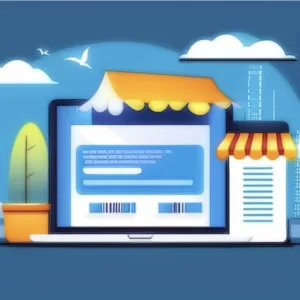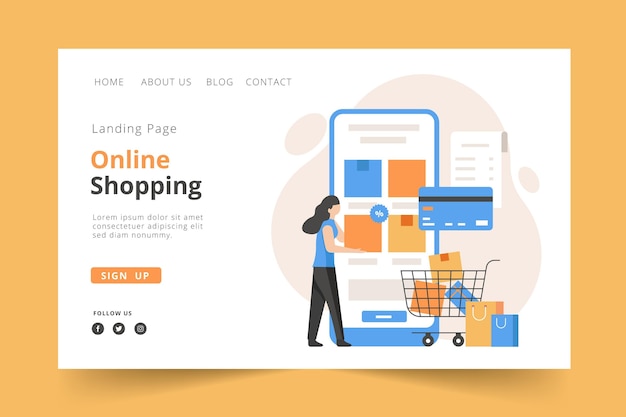However, continue reading, as there are essential tactics you should be aware of
 Initiating an online business is a compelling method to generate income in the current digital era. As stated by Ryan BeMiller, the head of the shopping cart review website ShoppingSignals, “Ecommerce is a rapidly expanding sector and continues to grow at double-digit percentages.” But with the abundance of online stores already, is it feasible to establish a profitable online store?
Initiating an online business is a compelling method to generate income in the current digital era. As stated by Ryan BeMiller, the head of the shopping cart review website ShoppingSignals, “Ecommerce is a rapidly expanding sector and continues to grow at double-digit percentages.” But with the abundance of online stores already, is it feasible to establish a profitable online store?
Is it feasible or are there too many online stores already? Is the market too saturated?
Considering there are over 24 million online stores worldwide, it’s reasonable to question if the market is too saturated. However, with the increasing number of people shopping online, there’s still ample opportunity for new profitable online stores. It’s vital to select a specific niche to target and understand how to locate your customers online, enabling you to engage with them and persuade them of your value. Equally important is to distinguish your store from competitors – by providing unique products, superior customer service, and intelligent marketing tactics.
What you can do: Conduct thorough market research and identify a specific niche that you can target. Differentiate yourself from competitors by providing unique products, superior customer service, and implementing robust marketing tactics.
What type of online store is simplest to make profitable?
 While eBay is a well-known platform for initiating an online store, there are numerous other opportunities to establish a profitable online business. It’s crucial to select an online store that aligns with your skills and interests. Platforms like Amazon and Etsy cater to specific niches, while Shopify provides a more customizable approach to building an online website.
While eBay is a well-known platform for initiating an online store, there are numerous other opportunities to establish a profitable online business. It’s crucial to select an online store that aligns with your skills and interests. Platforms like Amazon and Etsy cater to specific niches, while Shopify provides a more customizable approach to building an online website.
What you can do: Choose an online store that aligns with your skills and interests. Consider platforms like Amazon and Etsy for specific niches or Shopify for a more customizable approach.
Do I require a standalone website if I’m selling on eBay, Amazon or Etsy?
You do not! This is a significant advantage to selling on those platforms. They allow you to post all your products and product categories and Terms of Service and provide users a method to contact you, etc. You won’t have to construct an external store, like a Shopify store or a WordPress WooCommerce store, etc.
Of course, these three platforms take a percentage of your sale, which is the tradeoff. Selling on your own standalone website allows you to retain more of the profit – BUT – you’ll be responsible for driving the traffic to your website, which is challenging. There’s always a trade off!
How do I select an online platform?
Selecting an online platform is a critical decision when constructing your online store. Factors to consider include ease of use, payment options, fees, and customization options. Shopify is a popular choice among online store owners due to its ease of use and extensive customization options. Amazon and Etsy are also popular choices, but they come with more restrictive selling guidelines and fees.
What you can do: Thoroughly research online platforms and consider factors such as ease of use, payment options, fees, and customization options. Shopify is a popular choice among online store owners due to its ease of use and extensive customization options.
How much time should I anticipate working on my new online store each week to make it operational and profitable?
The amount of time you should anticipate working on your online store depends on the size of your store, the complexity of your products, and your marketing strategy. Initially, it’s common to spend 20-30 hours per week on your store, but as it expands and becomes more profitable, you can reduce your time.
What you can do: Be prepared to spend at least 20-30 hours per week initially, but aim to reduce as your store expands and becomes more profitable.
Do I require a lot of special skills to operate a profitable online store? If so, what are they?
While it’s beneficial to have a background in business or marketing, you don’t need to be an expert in either to operate a profitable online store. However, skills like social media marketing, content creation, customer service, and basic accounting will be beneficial in constructing and expanding your online store.
What you can do: Develop skills in social media marketing, content creation, customer service, and basic accounting to help construct and expand your online store.
Do I need to be a computer expert to sell online?
You don’t need to be a computer expert to sell online, but you should be comfortable with technology and willing to learn. Most online platforms are user-friendly and don’t require a lot of technical knowledge to set up and maintain.
If you’re not familiar with online commerce or online selling, take the time to learn the basics, such as how to set up an online store, manage inventory, and process orders. There are many resources available to help you get started, including online courses, tutorials, and support forums.
Remember, the more you know about online commerce and online selling, the easier it will be to operate a successful online business.
Next steps you can take: Familiarize yourself with online commerce basics by taking an online course, reading tutorials, and seeking out support forums.
What are the 6 most crucial steps I should take now to begin selling online or constructing an online store?
If you’re ready to start constructing your profitable online store, here are six steps to get you started:
1. Select Your Niche and Your Products or Services
First and foremost, select a niche for your store. It’s important to select a niche that you’re passionate about and knowledgeable in, but also has potential for profitability. Conduct market research to see what products are currently in demand and which have low competition. You can use tools like Google Trends, Amazon Best Sellers, and social media to help you identify a profitable niche.
2. Identify Your Target Market and Customer
Once you’ve selected your niche, it’s important to identify your target market. Who are your ideal customers? What are their pain points, and how can your products or services help solve their problems? Identifying your target market will help you tailor your marketing messages and product offerings to appeal to the right people.
3. Select Your Online Platform
Selecting the right online platform is crucial to the success of your online store. You want a platform that is easy to use, offers the features and functionality you need, and is scalable as your business grows. Shopify is a popular choice, but you can also consider other platforms like WooCommerce, BigCommerce, and Magento. Also, remember, Etsy, eBay and Amazon are choices that don’t require a stand-alone website.


